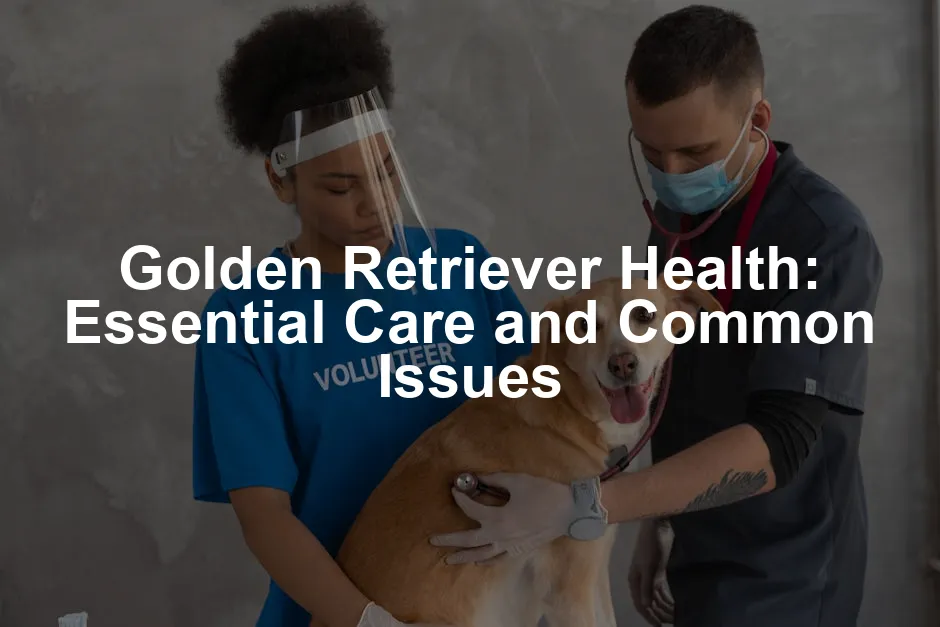Introduction
Golden Retrievers are loved for their friendly nature. Their playful and affectionate temperament makes them popular family pets. Understanding their health needs is crucial for providing the best care possible. This article will cover key health issues, preventive measures, and essential care tips for your Golden Retriever.
If you’re looking for a comprehensive resource on the breed, check out the Golden Retriever Dog Breed Book. It’s packed with information that can help you understand your furry friend better and improve your training and care practices!
Summary and Overview
Golden Retrievers generally enjoy good health and have an average lifespan of 10 to 12 years. However, they are prone to certain health issues. Common concerns include hip dysplasia, various cancers, and skin allergies. Regular veterinary check-ups are vital for early detection. Responsible breeding practices also play a significant role in minimizing health risks. As a pet owner, it’s essential to educate yourself about your dog’s specific health needs.

Understanding the common health issues can help you provide better care for your Golden Retriever. Learn more about hip dysplasia.
Understanding Golden Retriever Health
General Health Characteristics
Golden Retrievers are medium to large-sized dogs. Males typically weigh between 65 to 75 pounds, while females weigh around 55 to 65 pounds. Their lifespan ranges from 10 to 12 years. Known for their gentle demeanor, they are friendly and eager to please. However, they face breed-specific health challenges. Awareness of these issues can help owners prepare and provide proper care. Familiarizing yourself with Golden Retriever characteristics will guide you in maintaining their health effectively.
Speaking of health, keeping your pup fit requires the right nutrition. Consider investing in High-Quality Large Breed Dog Food. It’s formulated to meet their specific dietary needs, helping them grow strong and healthy!

Common Health Issues
Hip Dysplasia
Hip dysplasia is a genetic condition affecting many Golden Retrievers. It occurs when the hip joint doesn’t fit properly, leading to arthritis. Symptoms often include a reduced range of motion, stiffness, and a reluctance to exercise. Watch for changes in your dog’s gait or activity level. Treatment options range from medications to surgery, depending on severity. Regular vet check-ups can help identify this issue early. Maintaining a healthy weight and providing proper nutrition can also support joint health.
To further support your dog’s joint health, consider adding a Joint Supplement for Dogs to their diet. These supplements can help maintain joint mobility and reduce discomfort, ensuring your furry friend stays active and playful!

Elbow Dysplasia
Elbow dysplasia is a common orthopedic concern in Golden Retrievers. This condition arises when the elbow joint fails to develop properly, leading to arthritis and mobility issues. Affected dogs may struggle with activities like running and jumping, impacting their quality of life.
Symptoms often include lameness, reduced range of motion, and pain when the joint is touched. If your Golden Retriever shows reluctance to engage in normal play or exercise, it’s essential to consult a veterinarian. Early detection can help manage the condition effectively.
Preventive measures include maintaining a healthy weight and providing appropriate exercise. Regular vet check-ups and screening for joint health can also reduce the risk of elbow dysplasia. By being proactive, you can help your furry friend stay active and enjoy life to the fullest.
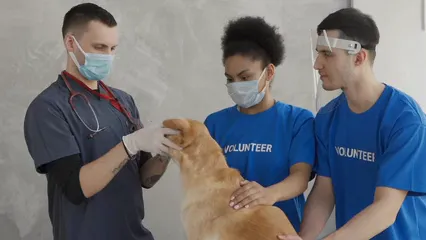
Cancer
Cancer is a serious health issue for Golden Retrievers. Alarmingly, about 60% of Golden Retriever deaths are attributed to this disease. Common types include lymphoma, hemangiosarcoma, and osteosarcoma. These cancers often emerge during middle age or later.
Early symptoms can be subtle but include sudden weight loss, lumps on the body, and loss of appetite. It’s crucial to monitor your dog for any unusual changes. Regular veterinary check-ups can help detect issues early, improving treatment outcomes.
While there is no guaranteed prevention for cancer, maintaining a healthy diet and regular exercise can lower risk factors. Ensuring vaccinations are up to date and avoiding harmful chemicals in their environment can also contribute to a healthier life. Staying informed about your dog’s health can make a difference.
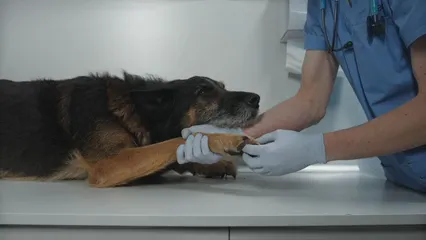
Hypothyroidism
Hypothyroidism is a common endocrine disorder in Golden Retrievers. This condition occurs when the thyroid gland does not produce enough hormones, leading to various symptoms. Affected dogs may experience weight gain, lethargy, and thinning fur.
Symptoms might be gradual, so regular monitoring is essential. If you notice your dog becoming less active or gaining weight despite a normal diet, it’s time to consult your vet. Blood tests can confirm the diagnosis.
Management typically involves daily medication to regulate hormone levels. With proper treatment, dogs can lead healthy, active lives. Regular vet visits are crucial to adjust medication as needed, ensuring your Golden’s well-being remains a priority.

Allergies and Skin Issues
Golden Retrievers are prone to various allergies and skin issues. Common allergens include pollen, dust mites, and certain foods. Symptoms often manifest as itching, redness, or hot spots on the skin.
Ichthyosis is another genetic skin condition affecting this breed, causing dry, scaly skin that can lead to infections. Regular grooming can help manage these symptoms and keep skin healthy.
If your dog shows signs of excessive scratching or licking, consult your veterinarian for advice. Treatments may include antihistamines, medicated shampoos, or dietary changes. Understanding your Golden’s specific allergies can help you create a comfortable environment for them. For more on skin conditions, check out this guide on skin allergies.
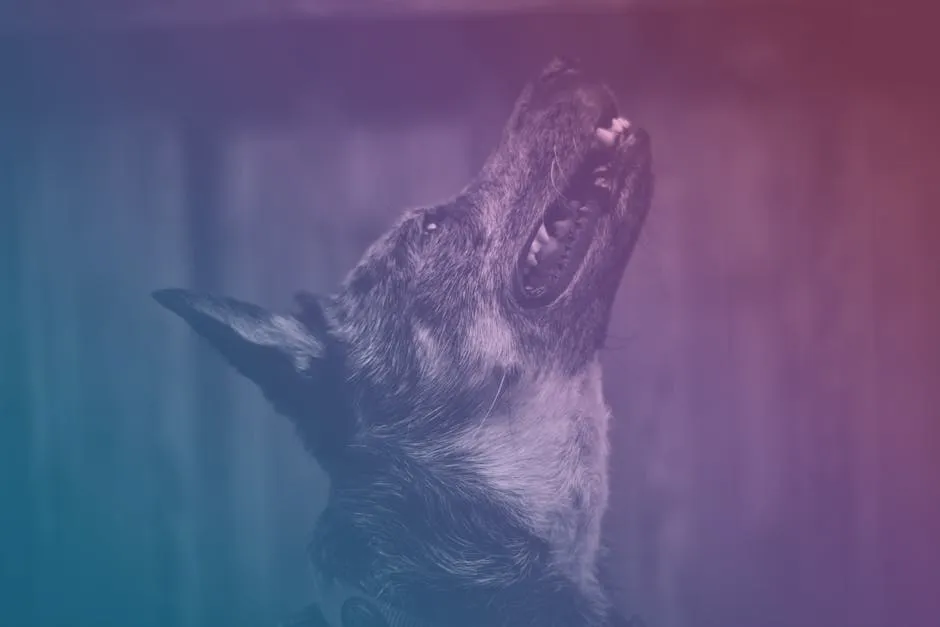
To further assist your pup with skin issues, consider using Dog Shampoo for Sensitive Skin. It can help soothe irritations and keep your dog’s coat healthy and shiny!

Managing your dog’s skin issues is essential for their comfort. Learn more about treating skin issues.
Eye Conditions
Golden Retrievers are prone to several eye conditions. Cataracts and glaucoma are among the most common issues. Cataracts can develop at an early age, leading to cloudy vision or even blindness. Regular eye examinations can help catch these problems early and ensure your dog’s vision remains clear. Glaucoma, characterized by increased pressure in the eye, can also lead to severe pain and loss of sight if untreated.
Monitoring your dog’s eyesight is essential. If you notice any signs of discomfort, such as squinting or excessive tearing, consult your veterinarian. Maintaining eye health in dogs requires regular vet visits. Early detection of Golden Retriever eye conditions can significantly improve treatment outcomes. Make sure to prioritize your furry friend’s eye health with routine check-ups.

Heart Issues
Heart problems can affect Golden Retrievers, with subvalvular aortic stenosis being a notable concern. This condition narrows the heart’s aortic valve, impeding blood flow. Symptoms often include lethargy, coughing, and fainting spells during exercise. If you notice these signs, it’s crucial to seek veterinary advice.
Treatment options vary based on severity. Mild cases may only require monitoring, while more serious cases could necessitate medication or surgery. Regular check-ups are vital for maintaining dog heart health. Early diagnosis can lead to better management of canine heart disease. Keeping an eye on your Golden’s overall well-being will help ensure a longer, healthier life.
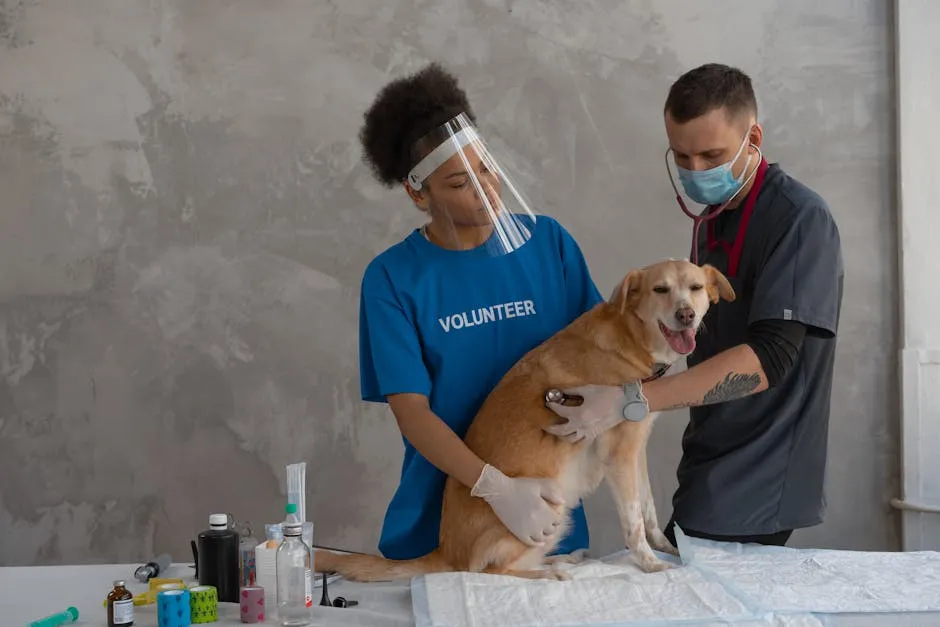
Nutrition and Diet
Feeding Guidelines for Golden Retrievers
A balanced diet is crucial for Golden Retrievers. Their nutritional needs vary based on age and activity level. Puppies require nutrient-rich food to support their growth, while adults benefit from maintaining a healthy weight. Overfeeding can lead to obesity, which poses serious health risks.
To prevent weight gain, follow a consistent feeding schedule. Measure portions and avoid excessive treats. High-quality dog food designed for large breeds is advisable. Additionally, consult your veterinarian for personalized dietary recommendations. Proper nutrition is vital for your Golden Retriever’s overall health and longevity. Remember, a well-fed dog is a happy dog!
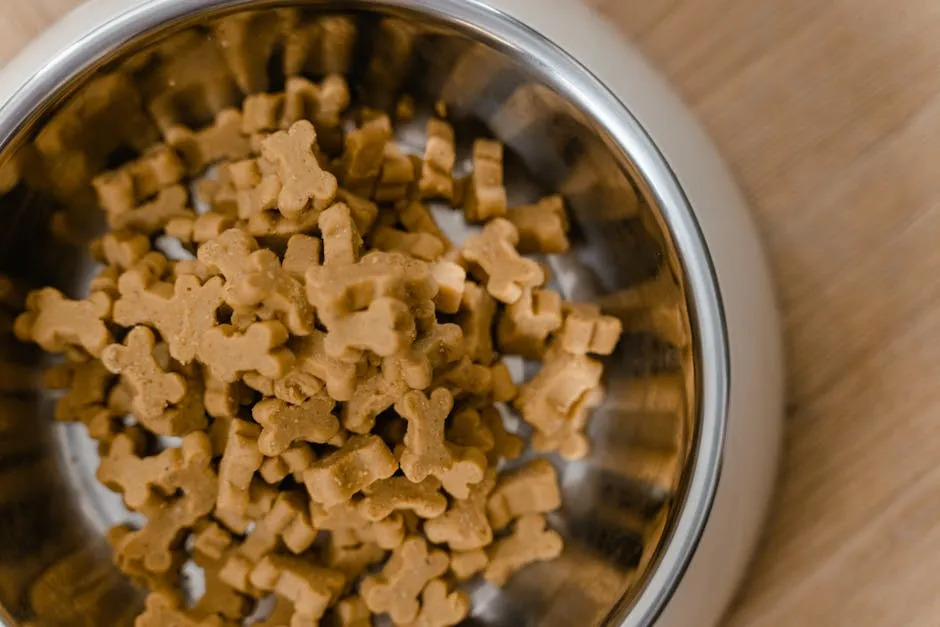
Grooming and Care
Grooming Needs
Regular grooming is essential for Golden Retrievers. Their thick, double coat requires consistent care to prevent matting and skin issues. Aim to brush your dog at least once a week, increasing frequency during shedding seasons.
Managing shedding is crucial, as it helps keep your home clean. Regular baths using dog-friendly shampoo can further enhance coat health. Don’t forget to check ears and paws for dirt or debris. Proper grooming not only keeps your dog looking great but also contributes to their overall well-being. Prioritize grooming as part of your Golden Retriever’s care routine for a healthy coat and skin.

For added convenience, consider using a Dog Grooming Brush. It makes the grooming process easier and more effective!
Preventive Health Care
Regular Vet Visits and Health Checks
Routine veterinary care is essential for your Golden Retriever. Regular health check-ups help prevent potential issues and catch any signs of illness early. Vaccinations protect against common diseases, ensuring your furry friend stays healthy and happy.
Golden Retrievers benefit from specific health screenings. These include evaluations for hip and elbow dysplasia, eye conditions, and heart issues. Discuss these screenings with your veterinarian to determine the best schedule for your dog. Regular dental check-ups are also vital, as dental disease can lead to other health problems.
Preventive dog care promotes a longer, healthier life. By staying proactive, you can help your Golden Retriever avoid serious health issues down the line. Make it a habit to schedule annual vet visits and keep your dog’s vaccinations up to date. This simple step can make a big difference in their well-being.
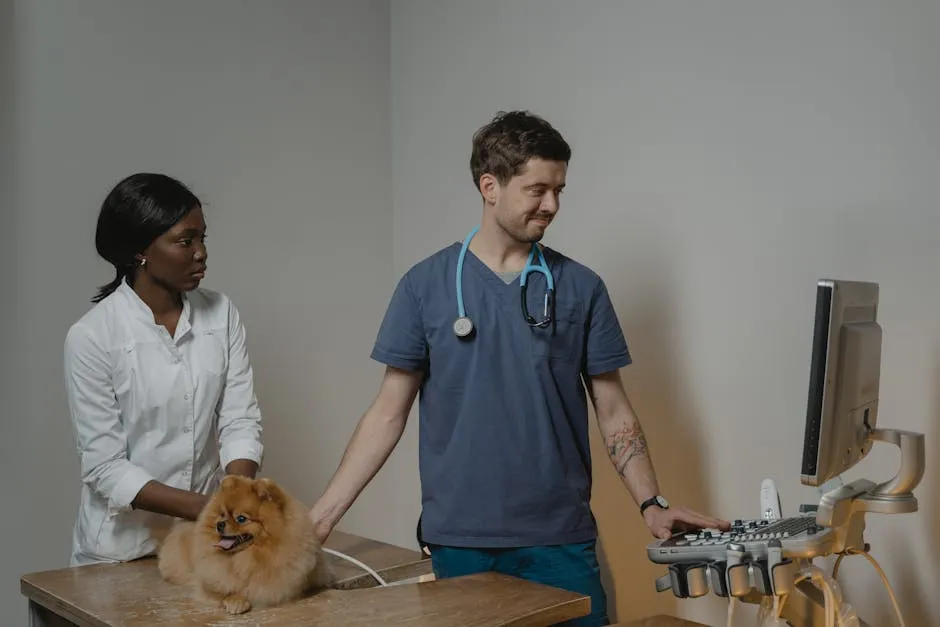
Also, consider keeping a Dog First Aid Kit handy for emergencies. It’s always better to be prepared!
Conclusion
In summary, Golden Retrievers require attentive health care to thrive. Regular veterinary visits and preventive measures are key to maintaining their health. By being proactive and informed, you can help your furry friend lead a long, happy life. Stay engaged and prioritize your dog’s health needs. Your commitment will ensure they remain a cherished part of your family for years to come.
FAQs
Do Golden Retrievers require a special diet?
Yes, Golden Retrievers have unique dietary needs. They thrive on a balanced diet tailored to their age and activity level. Puppies need nutrient-rich food to support their growth. Adult Goldens require careful portion control to prevent obesity. Overweight dogs are at risk for joint issues and heart problems. Opt for high-quality dog food formulated for large breeds. Look for options that meet AAFCO standards. Regularly consult your veterinarian for personalized feeding advice. This ensures your furry friend stays healthy and energetic.
Are Golden Retrievers prone to allergies?
Yes, Golden Retrievers can suffer from allergies. Common allergens include pollen, dust mites, and certain foods. Symptoms often manifest as itchy skin, redness, or ear infections. You might notice your dog excessively licking or scratching certain areas. Skin conditions like hot spots can arise from allergies too. If you see these signs, consult your veterinarian promptly. They may recommend antihistamines or special diets. Identifying allergens can help you keep your Golden comfortable and happy.
How often should I groom my Golden Retriever?
Grooming is essential for Golden Retrievers. Aim to brush your dog at least once a week. During shedding seasons, increase this to two or three times a week. Regular brushing helps manage loose hair and prevents matting. Bathing should occur every few months or as needed to keep their coat clean. Don’t forget to check their ears and paws regularly for dirt or irritations. Proper grooming not only keeps your dog looking good but also promotes overall health.
What should I do if I notice signs of illness in my Golden Retriever?
If you notice signs of illness, act quickly. Symptoms may include lethargy, vomiting, or changes in appetite. Contact your veterinarian for guidance. Early intervention can be crucial for effective treatment. Regular vet visits are key to monitoring your dog’s health. Keep an eye on any unusual behavior or physical changes. Being proactive ensures your Golden Retriever receives the best care possible. Your quick response can make a significant difference in their well-being.
Please let us know what you think about our content by leaving a comment down below!
Thank you for reading till here 🙂
All images from Pexels

